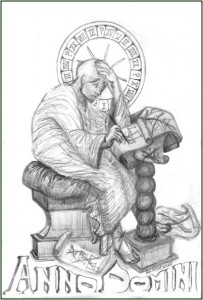Happy Conspiratorial New Year
Posted in General on December 30th, 2011 by Eugene Finerman – Be the first to commentHappy New Year–but it is not the year you think!
 According to the most charitable calculation, our A.D. chronology is off by at least four years. The mistake dates back to the early sixth century. Until then, even the Church was using the pagan calendar. That chronology was based on the legendary founding of Rome; as a cross-reference, it also cited whichever sycophant or relative of the emperor was serving as a Roman consul. For example, if you check the Vatican archives, the notarized date for the Nicene Creed should read “in the 1,078th year of Rome and the term of Sextus Anicus Paulinus.” (Who? Exactly. The Emperor wouldn’t have trusted him, otherwise.)
According to the most charitable calculation, our A.D. chronology is off by at least four years. The mistake dates back to the early sixth century. Until then, even the Church was using the pagan calendar. That chronology was based on the legendary founding of Rome; as a cross-reference, it also cited whichever sycophant or relative of the emperor was serving as a Roman consul. For example, if you check the Vatican archives, the notarized date for the Nicene Creed should read “in the 1,078th year of Rome and the term of Sextus Anicus Paulinus.” (Who? Exactly. The Emperor wouldn’t have trusted him, otherwise.)
Western Civilization obviously needed a shorter and less pagan date. In the 1278th year of Rome (alias A.D. 525), the Church finally converted its calendar. The new chronology, based upon the birth of Jesus, was calculated by a Byzantine monk named Dionysius Exiguus. Dionysius is not the most trustworthy name for a mathematician or a monk. In fairness, however, the poor guy was working with Roman numerals. (MCCLXXVII minus DXXV =…) It is amazing that his chronology was wrong by only four years.
He reckoned that Jesus was born in the 753rd year of Rome; that year was christened Anno Domini I. Unfortunately Dionysius had not bothered to check his answer with the New Testament or any of the Roman histories available at the local Byzantine library. The Bible is quite specific that Jesus was born during the reign of Herod the Great, Rome’s designated thug of Judea. But Herod died in the 750th year of Rome, four years before Dionysius’ timetable would have permitted it. So by A.D. 1 Jesus was hardly an infant; he may have been halfway to His Bar Mitzvah. The Church apparently caught the error, because Dionysius was not made a saint. Yet, it never corrected that mistake. The Church seems to be quite ecumenical about arithmetic.
Ironically, the Reformation never publicized the mistake, either. Consider how the Protestants initially rejected the Gregorian Calendar, preferring the less accurate but un-Catholic Julian calendar. They could have taunted the Church, “We may be 11 days off but you Papists are wrong by four years.” Yet, the followers of Martin Luther, Jean Calvin and John Knox were surprisingly silent. You would expect them to wish you a dour but mathematically precise New Year.
No, all of Christendom went along with the cover-up. The secret was confined to faculty lounges. Then Johannes Kepler broke the silence. In 1613-14 the mathematician published his exposé De Vero Anno quo Aeternus Dei Filius Humanam Naturam in Utero Benedictae Virginis Mariae Assumpsit. Of course, the only people who even understood the title were college professors and Jesuits, and it was no secret to them. His book was not worth burning, even in Spain. Kepler would have to become famous for astronomy.
Since then, historians mention the chronological error as a point of pedantic pride. They are indisputably right and best ignored. In this case, the truth would be messy. The four-year discrepancy is rooted in our world. If Anno Domini is not a standard of history, it is a matter of faith for many, and a matter of convenience for all.